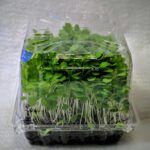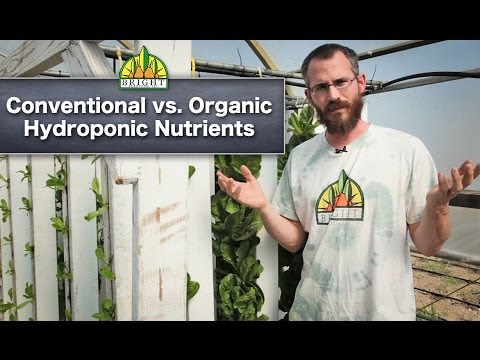Conventional vs. Organic Hydroponic Nutrients
As I found out after completing a two-year Agricultural Diploma course and from taking courses from Canada’s leading agricultural college, the agricultural school professors maintain that plants can’t tell and don’t care whether the nitrogen they absorb comes from humus composted from old vegetation or animal manure (organic hydroponics), or from ammonium nitrate spray made in a chemical factory (conventional hydroponics).
Conventional hydroponic nutrients are chemically pure and deliver precisely the nutrients that you pay for whereas organic nutrients made from some mixture of bat manure, kelp, and old crab shells are imprecise, full of impurities and impossible to measure the exact nutrient formulation of.
The primary difference between conventional vs organic nutrients (other than the industrial origin of one and the natural origin of the other) is that the chemical nutrients can be immediately absorbed by plants and the organics need a rich, living microflora (many kinds of soil microbes) to break them down into the chemicals that plants can absorb.
Are vegetables grown with conventional hydroponic nutrients as nutritious vs. those grown in soil or with organic nutrients?
The bottom line is it depends on the nutrient solution the vegetables are grown in, but hydroponically grown vegetables can be just as nutritious as those grown in soil.
“Much as I think that soil is just great for growing plants, hydroponics has come a long way,” said Marion Nestle, a professor of nutrition, food studies and public health at New York University. “I’ve seen hydroponic producers who have tested their leafy greens for key nutrients, and the amounts fall well within normal limits for their crop and are sometimes even higher.”
Traditionally, plants obtain nutrients from the soil. With hydroponics, the plants get nutrients from a solution instead. (Aeroponics, in which the plants’ roots are suspended in the air, is similar except fertilizer is misted onto the roots.) Usually found in large warehouses or greenhouses, hydroponic plants are arranged indoors, often in tall shelves, and they rely on artificial light rather than sunlight.
What about Vitamins?
Plants make their own vitamins, so vitamin levels tend to be similar whether a vegetable is grown hydroponically or in soil. It’s the mineral content that can vary in hydroponic crops, depending on the fertilizer used.
“You can enhance” a plant’s nutrient levels “simply by adding nutrients to the solution” they’re grown in, said Allen V. Barker, a professor at the Stockbridge School of Agriculture at the University of Massachusetts, Amherst. “You could add whatever you wanted: calcium or magnesium, or minor elements like zinc or iron.” The result is that vegetables grown hydroponically could even be “nutritionally superior” to traditionally grown ones, he said.
Please note that this site is supported by affiliate marketing which means that a small portion will be paid to maintain this site from any purchases made through it. This in no way affects the price of the products on this page.
Conclusion – Conventional vs. Organic Hydroponic Nutrients
Keep in mind that nutrient content varies for produce in general, regardless of the growing method. The differences relate to the type of fruit or vegetable, the time of year it is harvested, how long after harvesting the crop gets eaten, and how it is handled and stored from farm to fork. Remember, too, that these differences in nutrient levels are unlikely to have a significant impact on overall health.
I have included only the best and most used nutrients below – all are well respected in the hydroponic world. You can use them with complete confidence!
Check out the article HERE on how to mix nutrients – there is a trick to it!
I look forward to hearing your opinions on this topic. Please follow and share!
Related Posts
Can You Profit From Hydroponics?

5 (8) Did you hear the story of a farmer who started growing strawberries? Yes? But, do you know he…








This is a very good post and I like the fact that you can really explain to me how this all works out for me. It is a good thing mostly because I didn’t understand their difference but you differentiated it very well. It is good and I think that the conventional is better because when it comes to planting, nutrients are always a better pick. Nice one here. I learned from this post.
Thank you so very much! I’m glad you enjoyed!
Thanks for this great article on the conventional growing system and the organic hydroponics, initially I do believe that plant grown through chemicals do have some side effects than the natural ones but with this post, I understand they are are the same none is lacking out of them both, thanks for sharing this great post with us gonna try and plant a vegetable using organic hydroponic method
Thank you, Rose, and bets of luck on your growing efforts! I think you’ll find hydroponics to be fun as well as yummy!
Though it has not been too long that I switched my means of gardening to the hydroponics from the conventional ways. Though this is not meanig anything, I actually feel that the hydroponics is better to me and I have mastered all the little details here. Thanks and I will share this out.
Thank you so much and also for sharing. I’m so glad you are already a “hydroponics believer”!
What a great post you have shared about the conventional planting and the organic hydroponic, you have enlightened us on really what hydroponics are I really wanna ask a question if we plant our vegetables through hydroponic as you said in the article,won’t it be hazardous to the health due to the chemicals in it?thanks
If you purchase ANY kind of nutrients (whether conventional or organic) ALWAYS keep them up and out of reach of children or pets. I mean, you wouldn’t want your child eating manure, would you? The same goes for the concentrated nutrients. You would be fine if you splashed some on you but I’m sure you would get quite sick if you slugged it back.
It’s a great idea to have an article explain in details the major differences between conventional and organic hydroponics. Well, as you’ve emphasized that they both have their own way of application, differences, but all these should be considered only by knowing the requirements of the plant. The only good difference I could point was that conventional hydroponics gets absorbed easily than organic.
Yes, that is exactly it – that conventional hydroponics nutrients are more easily absorbed by the plants. In addition, you can fine-tune exactly what nutrients you are adding, should you notice a deficiency showing on the plants.
I’m glad you clarified this topic. I would think that organic sources such as manure are better as to nutrient quality but obviously, there is no difference. The question is how can I know whether the plant really has everything it needs (or the best for its best condition). Can I find out any other way than just watching whether the plant thrives or not?
Hiya Lenka! Yes, watching your plants will definitely help to identify nutrient deficiencies or other problems but if you are careful in following the instructions (very detailed!) that come with conventional fertilizers, it’s hard to go wrong. The instructions specify how much of each nutrient for each growing phase of the plant.
That’s good to know! Thank you Darlene, I have to remember that!
Thank YOU, Lenka! I’m glad you liked it!
So are you saying that hydroponic plants can’t absorb organic nutrients because they can’t break them down? “the organics need a rich, living microflora (many kinds of soil microbes) to break them down into the chemicals that plants can absorb.”? What about pest control, are some hydroponic producers using organic pest control or is that not possible either because it relies heavily on biodiversity that would also be difficult to replicate in a hydroponic environment? I hadn’t really thought about this before, not that I buy organic vegetables anyway, but it is interesting given the rising popularity of organics.
Hiya Deb! Great questions! Actually, these microbes can and do exist in the reservoirs of many hydroponic systems. Some folk who use chemicals actually buy said microbes to add to their tanks for the overall health of the plants. So, in organics, what you get is a “slow-release” fertilizer as it slowly breaks down. With conventional, you get immediate results. Also, with indoor hydroponics, much effort is spent on ensuring no insect pests make it into the growing area. However, it most certainly happens and in that case organic would most definitely be the best and most WILL use organic in that case. Hope that helped!
This article is very informative in the differences between conventional and organic compost. You definitely swayed me to the conventional compost due to the precision of the nitrogen content.
I spend many summers back home in Ireland where I harvested my granddads potatoes by the wall of his apple tree garden. And he always said that cow manure was the best compost he ever used.
So, this bares the question, Where would you prefer to eat your vegetables from? Organically or Hydroponicly?
Hiya Conor! Actually, I have Highland cattle and guess where their manure goes? Yep, right into the garden. That is because the microbes in the soil will slowly break it down. Its an excellent slow-release form of nitrogen. Myself, I find that my hydroponics save me from a lot of bending over, no weeding, no pest control and I barely have to wash my hands! I would gladly eat either!
Hello Darlene; are you saying that hydroponically grown plants are of more nutritious value than earth-soil grown plants?
Because of human population spread. it is necessary to grow crops hydroponically as also the geographical location of the population that dictates what crop or plants can survive on the outside all year round.
I personally prefer the earth’s soil-grown crops. I am living in the tropics. The Crab shell and Ratbat manure, in my opinion, would be safer than the Ammonium, However, that is my human thinking.
Both manures’ are broken down into healthy substances in earth-soil or water-soil before they are absorbed by the plant. Do continue to keep the world informed.
DorcasW
Hiya Dorcas! Well, one professor that I quoted DID say that hydroponically grown plants with conventional nutrients were somewhat more healthy because they had received ALL of the proper nutrients in the proper amounts. Myself, though, I think this would be fairly negligible. Hey, if I was living in the tropics and could garden all year round, I would be doing what you are doing! As you also mentioned, with the urban sprawl in some areas, a warehouse pumping out tons of vegetables through hydroponics is just what is needed in that situation.
Even though I’m more of organic hydroponics user than conventional, I find no fault in both but I only got used to the organic because my father used it and I spent a lot of time with him in his gardens. Your selection should be based on your preference and what your plant requires, this brings us to the aspect of knowing you plants properly before applying any substances on them. Agriculture has grown to a stage where you don’t need to make compost to get the needed result, I hope I’ll be able to make use of more conventional hydroponics sometimes. It’s very thoughtful of you to share this helpful piece.
I just love your comments and agree with you 100%. You are so lucky to have learned from your father who probably had his organics down to a science for each type of plant. Many of today’s generation don’t have that background. Even my mom was a little hit and miss in this regard!
Well! I would say the inventions of science and the various breakthroughs have really helped us a lot in our daily living. For a truth, getting to plant hydroponically really helps a lot as everything planted is within the reach inside a restricted place without having to sol the hands. This is very well welcomed addition to me. I fancy it a lot and I will only stick with it rather than go back to the traditional ways
My aching back most definitely agrees with you, Shelley! I’m glad you liked the post
This is a very good post to explain all about the conventional and the organic hydroponics. I must confess that I didn’t really know all about this before but now seeing this makes me feel like I can really get the best out of it. The organic hydroponics wins it for me here and this is what I would prefer to venture into. Thanks.
I’m glad you enjoyed it and wish you all the best in your hydroponics adventure, John!